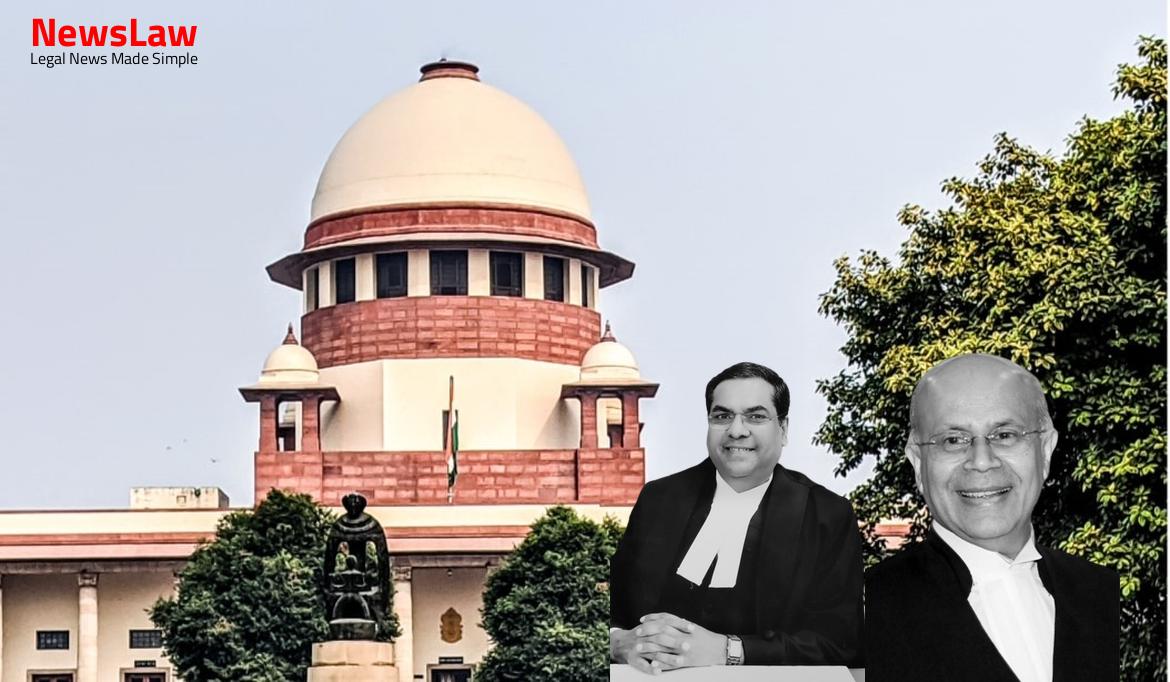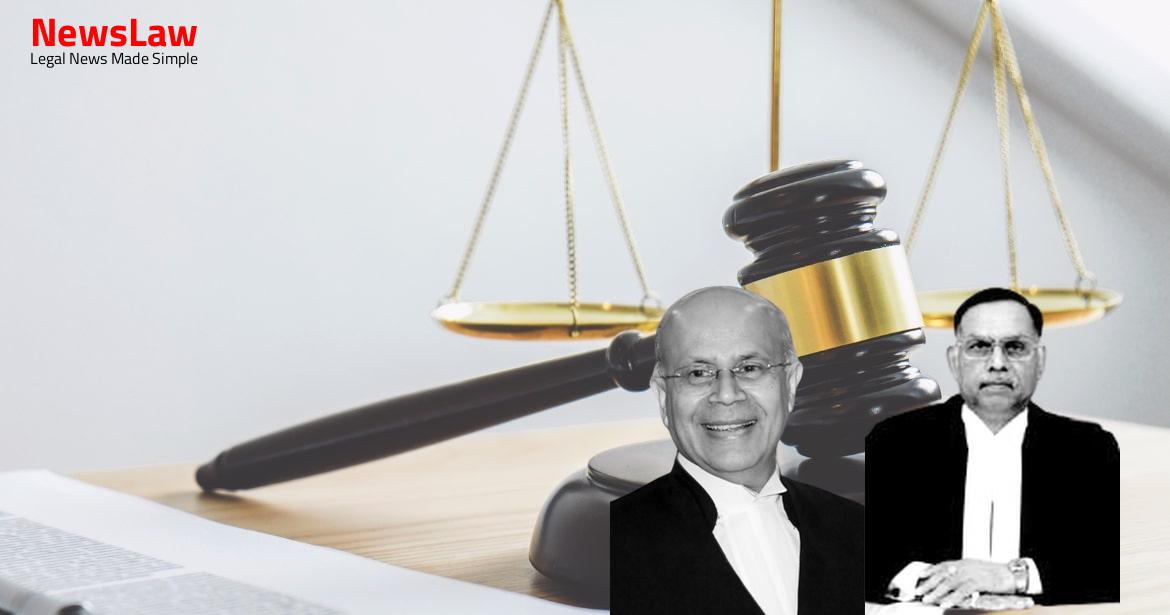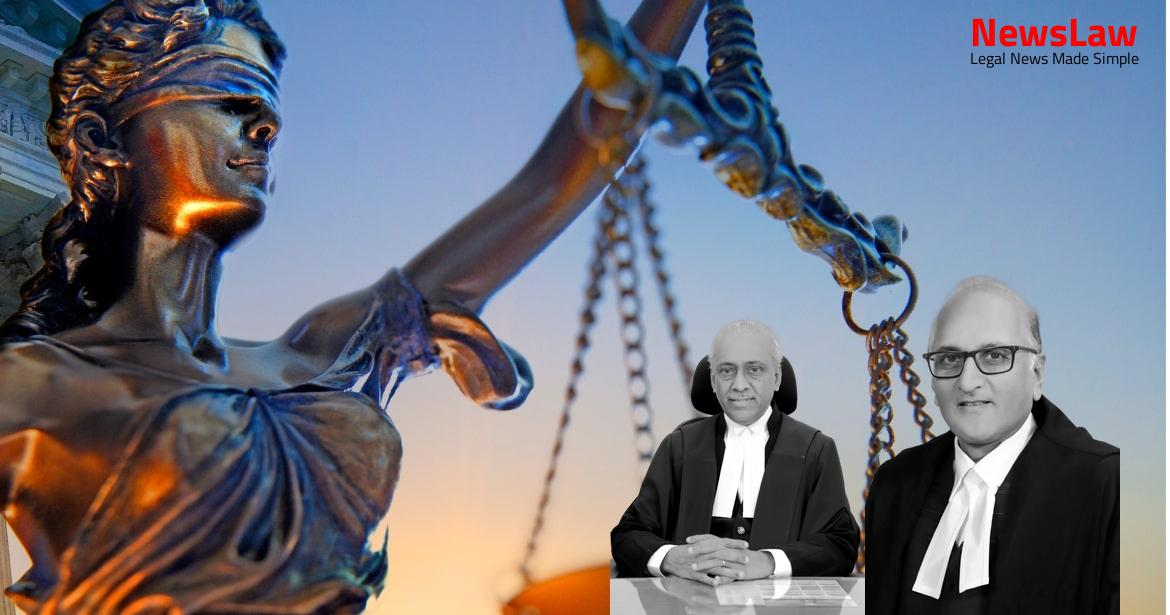A detailed overview of a significant legal battle between Matadin and Urmila Devi in the Supreme Court of India. The case revolves around a land dispute involving adverse possession claims. With the court’s judgement addressing the complexities of the matter, stay informed about the nuances and implications of this ruling.
Facts
- High Court in a second appeal should not have reappraised the evidence without finding of perversity.
- The suit lands consist of 4 out of 6 Biswas of land in Survey No 493 of Patwari Halka No.76 at Village- Purani Chhabani, Guna.
- The Trial Court decreed the suit in favor of the plaintiff based on adverse possession for more than 12 years.
- Regular Civil Appeal 19-A of 1996 by the appellants was allowed as Trial court overlooked documentary evidence.
- The second appeal by the plaintiff was allowed, reversing the first appellate court’s decision and restoring the Trial Court’s decree.
- Present appeal is against the High Court’s order allowing the plaintiff’s second appeal.
- The plaintiff Matadin filed Suit No 45-A/1995 on 28.08.1990 claiming adverse possession over the suit lands relying on Khasra entries for 1960-1961.
- The plaintiff sought a declaration of nullity against the sale deeds executed by the original land owners and subsequent thereto.
- The plaintiff never established the origin of his possession.
- The amendment of the plaint was considered an afterthought.
- The plaintiff never acquired title by adverse possession as the original owner sold the lands to Urmila Devi before the expiry of twelve years.
- The suit lands were sold to Urmila Devi by registered sale deed dated 11.10.1972.
Also Read: Judicial Standards and Compulsory Retirement Case: Supreme Court of India Judgment
Arguments
- Reliance was placed on M. Venkatesh & Ors. vs Bangalore Development Authority & Ors., (2015) 17 SCC 1 to argue that adverse possession requires peaceful, open, continuous, and hostile possession.
- Shri N.K. Jain, learned senior counsel for the appellants in Civil Appeal No 1091 of 2008, adopted the aforementioned arguments.
- Shri Puneet Jain, learned counsel for the respondents, stated that the plea of adverse possession was included in the original plaint and no new fact was sought to be introduced by way of amendment.
- Section 117 of the Madhya Pradesh Land Revenue Code (hereinafter referred to as the “Code”) was relied upon by Shri Puneet Jain to support the submission.
- The exoneration of the respondents in departmental proceedings and acquittal in the criminal case negates the findings of manipulations in the Khasra entries.
- The plaintiff’s continuous and uninterrupted possession for over 12 years, hostile to the original landowner, establishes a claim for adverse possession.
- The burden of proof to show interruption of plaintiff’s possession lies on the defendants, which they failed to do.
- No application for correction under Section 116 of the Code was filed by the original landowner at any point.
- The alleged claim for possession reiterated in 1963-1964 by the original landowner confirms the continuous hostile possession by the plaintiff.
- Mere execution of a sale deed does not amount to dispossession, establishing a presumption in favor of the correctness of the plaintiff’s possession as per Khasra entries.
Also Read: Supreme Court Judgement in a Criminal Case
Analysis
- The onus lay on the respondent to establish possession as a fact, open, hostile, and continuous to the knowledge of the true owner.
- Entries in red ink for corrections in the Khasra, claimed by the plaintiff, were deemed suspicious due to fraud and forgery.
- The plaintiff’s claim of uninterrupted possession for twelve years was found to be unsustainable.
- The High Court’s finding that Urmila Devi never acquired possession was considered perverse.
- Legal heirs of the plaintiff filed an application to amend pleadings to align with evidence of adverse possession.
- A person pleading adverse possession must clearly plead and establish all necessary facts.
- Mere possession does not result in possessory title until held adverse to the true owner’s rights.
- The respondent failed to establish peaceful, open, and continuous possession for adverse possession claim.
- In Civil Suit No. 97-A of 1992, appellants secured a decree against Hemraj for encroachment of lands purchased from Urmila Devi.
- The High Court’s conclusion on lack of evidence for the respondent’s dispossession was deemed unsustainable due to findings of fraud and forgery.
- Adverse possession involves hostile possession in denial of true owner’s title.
- The claim of possession based on failure of original land owners to return borrowed items was held to be perverse.
- The report of the court commissioner was not discussed by the High Court, indicating a lack of thorough consideration.
- Animus possidendi is a necessary element for adverse possession.
- Animus possidendi refers to the intention to possess the property as one’s own.
- The intention to possess must be exclusive and hostile to the rights of the true owner.
- Without the animus possidendi, adverse possession cannot be claimed.
- Adverse possession is a blended question of fact and law.
- The cited precedents do not merit consideration.
- Courts have a negative view towards statutes of limitation when they override property rights.
Also Read: Land Ownership Dispute: Supreme Court Judgment on Correcting Revenue Records
Decision
- The appeals have been allowed.
- The High Court’s order has been deemed unsustainable and set aside.
- The first appellate court’s order dated 08.08.1997 has been restored.
- As a result, the suit is dismissed.
Case Title: BRIJESH KUMAR Vs. SHARDABAI(DEAD) BY LRS
Case Number: C.A. No.-001090-001090 / 2008



